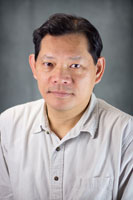Te-Chung Lee, PhD, University at Buffalo

Research in the Lee laboratory is focused on stem cell biology, engineering, and therapeutic applications with an emphasis on cardiovascular repair.
Dr. Lee's laboratory has explored the immunomodulatory property of bone marrow mesenchymal stem cells (MSCs) in cell transplantation studies, and found that large quantities of human and porcine MSCs can be implanted in immunocompetent pigs, mice, and hamsters without inducing inflammatory immune responses in the host. Their research shows that MSCs improve cardiac function in the porcine myocardial ischemia and hamster heart failure models. Implanted MSCs promote tissue regeneration by recruiting bone marrow progenitor cells and activating local host stem cell niches. These processes are mediated by inter-tissue cross-talk mechanisms involving signaling molecules such as JAK/STAT3, integrins, VEGF receptors, and Wnt/b-catenin. The Lee lab's long-term goal is to generate clinically relevant stem cell information that may be used to achieve robust therapeutic effects for a broad spectrum of human diseases and lower the cost of future stem cell therapy.
 Part of The Investigator's Annexe program.
Part of The Investigator's Annexe program.
Products
References
- Walowitz JL, Bradley ME, Chen S, Lee T. Proteolytic regulation of the zinc finger transcription factor YY1, a repressor of muscle-restricted gene expression. J Biol Chem. 1998 Mar 20;273(12):6656-61.
- Shabbir A, Zisa D, Lin H, Mastri M, Roloff G, Suzuki G, Lee T. Activation of host tissue trophic factors through JAK-STAT3 signaling: a mechanism of mesenchymal stem cell-mediated cardiac repair. Am J Physiol Heart Circ Physiol. 2010 Nov;299(5):H1428-38. doi: 10.1152/ajpheart.00488.2010.


